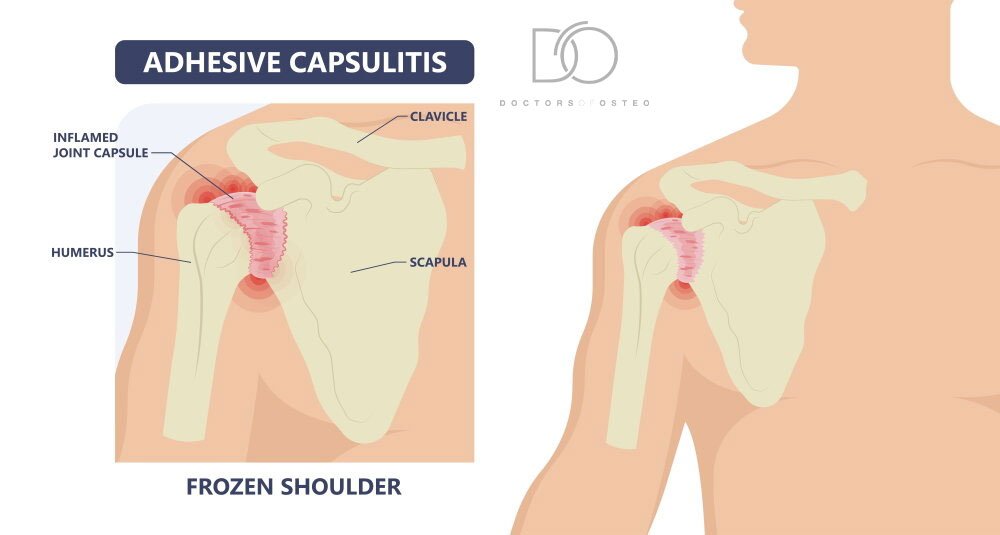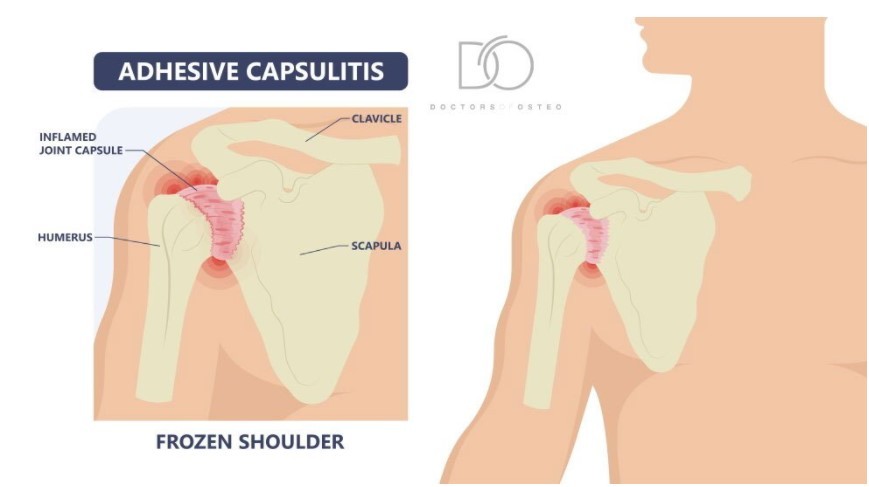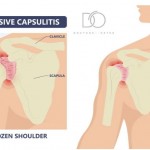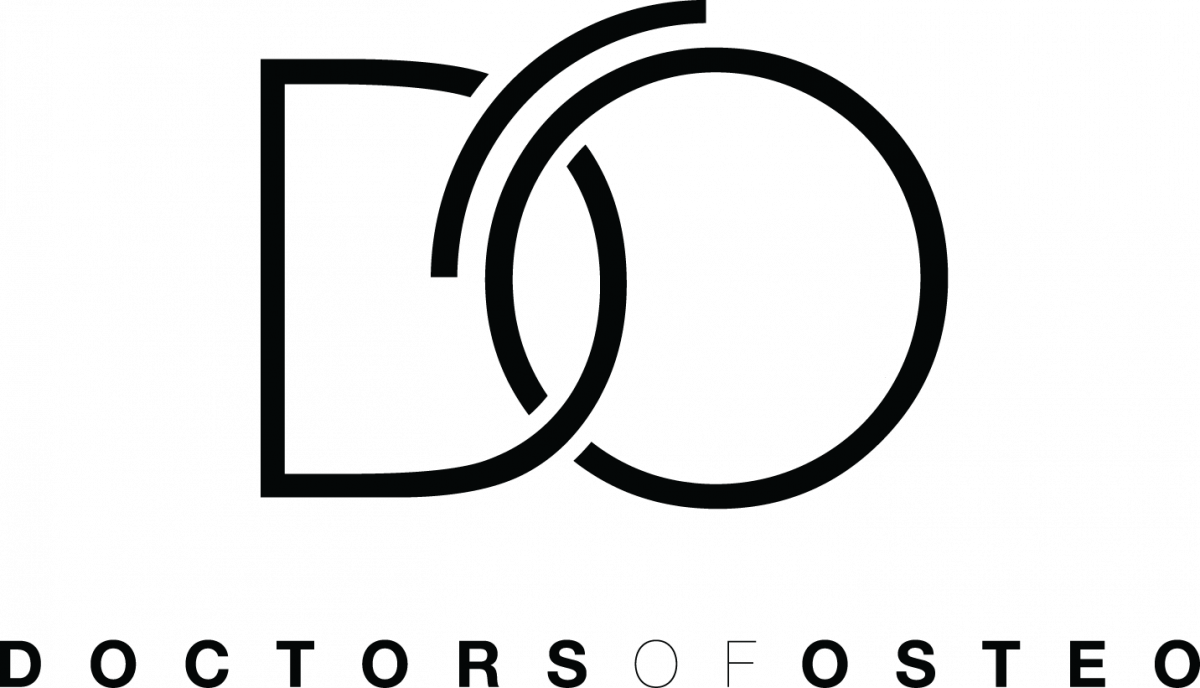Doctors of Osteo | Osteopathic Treatment for Frozen Shoulder
Doctors of Osteo are a team of natural healers who have dedicated their lives to osteopathic treatment. The Doctors of Osteo help those around them get better from injuries. Healing is their passion and they want to help you get back up on your feet as soon as possible. They know that the process of recovering from physical pain can be long and difficult but Osteopathy treatments, it can set you on. a road to recovery.
Through osteopathy treatment, their team can provide relief for a number of conditions, such as:
- Frozen Shoulder (Adhesive Capsulitis)
- Joint pain such as shoulder, hip pain and ankles
- Muscle pain and tightness
- Neck pain, headaches and migraines
- Back pain and sciatica
Doctors of Osteo are available to help you with your frozen shoulder, contact us today!
What is Frozen Shoulder (Adhesive Capsulitis)?
Adhesive Capsulitis, commonly known as 'Frozen Shoulder,' is a chronic and debilitating inflammatory condition of the shoulder that is highly limiting. It begins with minor restriction/pain that progressively worsens over time. The ailment can persist for 9 to 24 months on average..
‘Frozen Shoulder’ formally known as Adhesive Capsulitis, is a globally restrictive and painful inflammatory condition of the shoulder. It initially presents with minor restriction/pain that gradually worsens over time. The condition can last anywhere from 9 to 24 months.
How does Frozen Shoulder (Adhesive Capsulitis) occur?
Adhesive capsulitis occurs in three stages; Freezing, Frozen and Thawing.
-
Freezing stage: The shoulder gradually becomes restricted in all movements and pain levels increase.
-
Frozen stage: The pain levels may have decreased by this stage however the shoulder is at its peak in terms of restriction and becomes very difficult to use.
-
Thawing stage: The shoulder gradually becomes less restricted and pain levels decrease until the condition disappears completely.

What Causes Frozen Shoulder (Adhesive Capsulitis) of the Shoulder?
Adhesive capsulitis can be classified into a primary or secondary condition. When you have primary adhesive capsulitis, it is usually associated with hormonal imbalances and therefore, conditions such as diabetes, thyroid complications, high cholesterol and menopause are usually present. If you have secondary adhesive capsulitis, it is usually due to a long period of shoulder inactivity (i.e. trauma or post-surgery). The exact cause of Adhesive Capsulitis is largely unknown. However, it is hypothesised that inflammation leads to fibrous growth around the joint capsule and adhesions develop within the fluid inside. Fibrous growth and adhesions are thought to be the source of pain and restriction.
What should you avoid doing if you have Frozen Shoulder (Adhesive Capsulitis)
Immobilising/ Not moving the shoulder: If you have been diagnosed with a frozen shoulder you should consult a manual therapist (Osteopath) to commence rehabilitation treatment and exercise, as early management has favourable outcomes.
Not completing prescribed exercises: A individualised exercise program is important for the recovery of adhesive capsulitis to decrease the chance of long-term pain, regardless of any other treatments.
What treatment options are there for Frozen Shoulder (Adhesive Capsulitis)
The first-line treatment of frozen shoulder is physical therapy (i.e. osteopathic treatments) along with managing the pain through the use of analgesic medication (i.e. Neurofen, Panadol, Voltaren). A process called hydrodilatation is also recommended. This is where a needle (guided by ultrasound imaging) of corticosteroid, local anaesthetic and sometimes sterile water is injected into the shoulder, to stretch the joint capsule and separate adhesions. The success rate of hydrodilatation is estimated to be between 70-90%. TENs stimulation of the shoulder has also been found to be helpful in the frozen shoulder presentation.
The second line of treatment is the use of corticosteroid injections into the shoulder joint. This injection contains steroidal analgesic medication used to suppress inflammation. A suprascapular nerve block and ablation is also another option that can be explored with your general practitioner, where other treatment options have been unsuccessful.
If all other treatment options fail, a surgical procedure referred to as a ‘capsular release’ may be recommended. Referral to an orthopaedic surgeon is usually recommended at the 10-12 month mark when other conservative treatments haven’t improved the pain or function in the shoulder.
What can I do at home to help with Frozen Shoulder (Adhesive Capsulitis)
Ice: crushed ice or frozen peas placed over the front of the shoulder joint will help alleviate pain and inflammation.
-
Medication: Non-steroidal Antiinflammatories (NSAIDs) such as aspirin, ibuprofen and naproxen can reduce the inflammation and subsequent pain in the area. Always discuss medications with your general practitioner.
Swimming: Initially swimming may not be possible due to pain, however, the gravity-free exercise is good for the shoulder. Initially, simply walking up and down the pool will be beneficial. Vary the type of strokes you use after each lap and rest after every lap.
How can my Osteopath help with Frozen Shoulder (Adhesive Capsulitis)?
-
Assessing GAIT (Walking) Biomechanics: The positioning of your arms while walking plays an important role in shoulder conditions.
-
Sleeping: Shoulder pain commonly affects individuals ability to sleep. Your osteopath may be able to help provide appropriate positioning for comfort and relief.
-
Hands-on Treatment: Specific soft tissue, joint manipulation and adjunct treatment techniques are just some of the few modalities that can be implemented during your 45min appointment to promote tissue healing and fluid movement.
Exercises and stretches are always important to help with mobility of the shoulder. Strengthening exercises are also used to target the supporting muscles.
Final Thoughts on Osteopathy for Frozen Shoulder
Adhesive capsulitis, also referred to as frozen shoulder, is a condition that can be classified into primary or secondary. The most common form of adhesive capsulitis is the primary type which is usually associated with hormonal imbalances such as diabetes and thyroid complications. If you are suffering from frozen shoulder, your first line of treatment should be physical therapy (such as osteopathic treatments) along with analgesic medication to manage the pain.
In some cases, hydrodilatation may also be recommended. Our team of Doctors of Osteo are available to help you through this difficult time; contact us today for more information.
Doctor of Osteo’s team of osteopaths is available to help you with your frozen shoulder (adhesive capsulitis).
Providing healthcare with our osteopaths near me in Richmond, Hawthorn, Kew, Balwyn Canterbury, Camberwell, Glen Iris.



























